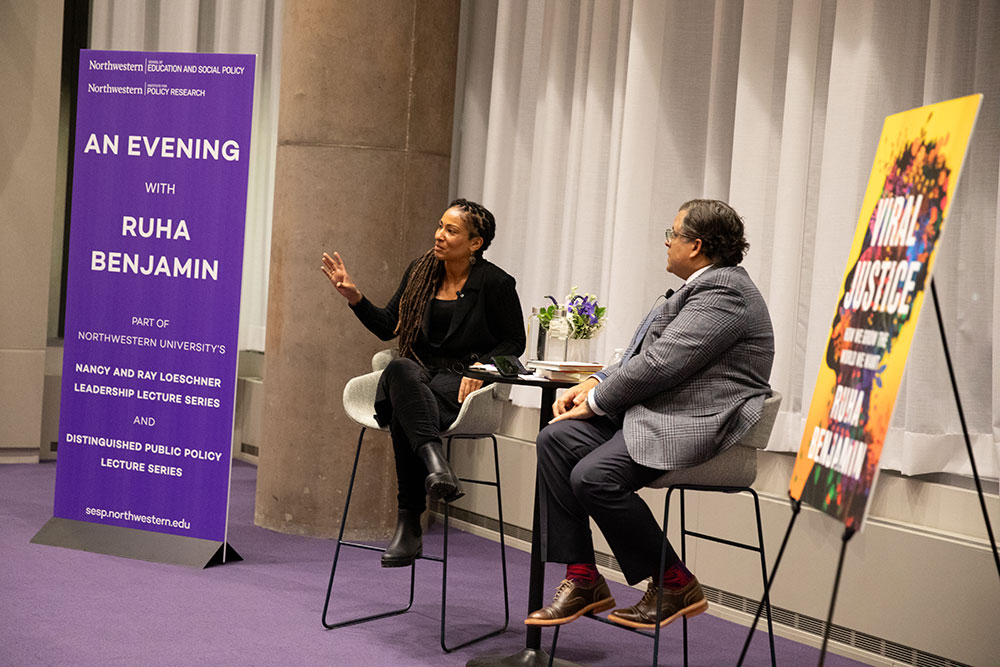Reckoning with the Impossible
Princeton author and scholar Ruha Benjamin urges us to question the status quo
Get all our news
I’m inviting people to strengthen the muscle of our collective imagination and to really question those things that we're told are impossible.”
Ruha Benjamin
Princeton University professor

Princeton University professor Ruha Benjamin (left) speaks with SESP Dean Bryan Brayboy (right) on Jan. 23.
Ruha Benjamin wants us to reckon with the impossible. A world without prisons? Schools that foster the genius of every child?
“We need to remind ourselves how many times people have overturned things that seemed impossible to change,” Benjamin, a sociologist and author, said during a recent talk at Northwestern University.
“We don't just have power in maintaining what's bad. We also have power in eliciting and growing what we actually want.”
Benjamin’s appearance, which drew an enthusiastic, standing-room only crowd at the Segal Visitors Center on Jan. 23, was part of the School of Education and Social Policy’s Nancy and Ray Loeschner Leadership Lecture Series and the Institute for Policy Research’s Distinguished Public Policy Lecture Series.
A professor of African American Studies at Princeton University, Benjamin is known for her groundbreaking research on race, technology, and justice. Her forthcoming book Imagination: A Manifesto will be released in February 2024.
"It is my honor to welcome our distinguished speaker, Ruha Benjamin, whose work exemplifies the spirit of the way that pushes us to think bigger and bolder how we approach these sorts of problems," said IPR Director and sociologist Andrew Papachristos.
Benjamin, a self-described “ambivalent academic,” talked with School of Education and Social Policy (SESP) undergraduate students over a buffet dinner before heading to the main event, an uplifting and wide-ranging conversation with SESP Dean Bryan Brayboy, the Carlos Montezuma Professor.
Below are edited highlights from her conversations:
Abolitionist thinking involves breaking apart and rebuilding. Benjamin’s two most recent books, Viral Justice and Imagination, urge readers to question the status quo and think about new ways to approach inequities in health care, education, work settings, and more. “It’s asking ourselves, what do we want to uproot? What do we want to grow? That can apply to every area of our life, personal, political, and everything in between. Abolition is reckoning with what we consider impossible in our own minds.”
Keeping one foot in the academy and one foot in the community changes the questions you ask. “It changes what I write about, how I write, how I'm thinking through things,” she said. “It makes the work more joyful and makes me feel more purposeful.”
You have to name something before you can fight it. Eugenics is often associated with Nazi Germany era, but from school funding to resource allocation and patient triage, “some lives are deemed desirable and others disposable,” Benjamin said. “This manifestation of a eugenics imagination poses the question: If there are powerful actors engaged in eugenic worldbuilding, what is the opposite? To work on it, we need language. We have to name it.”
Planting a seed is progress. “There was no evidence that slavery would ever end,” Benjamin said. “And yet because it was unlivable, our ancestors resisted. Most of them didn't see the end in their lifetime, but they planted that seed in the next generation. Or take public education, which was for the male elite. It was unthinkable to educate the poor and racialized children. Now it’s so taken for granted, some of us may even drag our feet and complain when we have to get up and go to school. I’m inviting people to strengthen the muscle of our collective imagination and to really question those things that we're told are impossible.”
Your environment matters. “I need to be among people who have a collective mission beyond the academy because that's what I care about,” Benjamin said. “It feels good to have priorities beyond our individual egos. One of my corny mantras is that we don't need stars. We need a constellation.”
Hope is a discipline. “You can keep yourself hopeful by shining a light on the things that are life affirming, the places and people that are working to create a more habitable planet for everyone,” she said. “As a teacher, I can't just diagnose what's wrong. I have to give students a sense of power to think about, okay, what are you going to do about that?”
Giving up hope is a luxury. “If your life depends on the systems changing into something new, then hope is something you need. As James Baldwin said, 'I can't be a pessimist, because I'm alive.' To be a pessimist means that you have agreed that human life is an academic matter. So, I'm forced to be an optimist. I'm forced to believe that we can survive whatever we must survive.”
Watch highlights from Benjamin's talk.
Photo credit: Eileen Molony
Published: February 1, 2024.